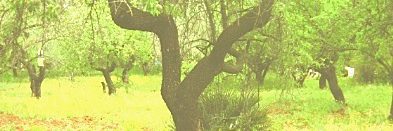Continuing my musings on plant nomenclature and the overwhelming presence of the word “love”: today it is Lad’s Love, Artemisia abrotanum. Ancient English gardeners must have been such a romantic lot, and associated this grey-green aromatic herb with a young man’s love. Apparently no nosegay (what a charming name for a delightfully scented bouquet!) for a sweetheart would be complete without a sprig or two of it.
Curiously this is called Colastrauch (Strauch = shrub) in German, which demonstrates just how much culture and tradition divide gardeners’ fancy. While the scent of this herb once turned an English country lad’s (or maiden’s) fancy into thoughts of love, to modern German gardeners it recalls the aroma of that quintessential American drink. I am not as fond of this drink now as I was in my youth, and the only occasion that I will drink it or order it willingly these days is when the hygienic conditions of the kitchen or the quality of the water are suspect. (On a month-long taxonomic survey across Morocco, our leader habitually drank it after every meal; this has been his strategy for immunizing his digestive system in all the years he’s been leading botanical expeditions worldwide.) And does it indeed smell of Coke? Just faintly, I have to admit. But perhaps Germans who customarily drink it will have a different view.
Lad’s Love is also called Maiden’s Ruin or Maid’s Passion, as its aphrodisiac qualities were considered highly potent. A sprig left under a pillow was believed in medieval times, according to Anthony Lewis, to lead to wanton venery. Besides Nicholas Culpeper, who mentioned that no more than a drachm should be taken in powder form, there is no precise recipe for an aphrodisiac using this herb. Jennifer Evans, poring over quantities of historical material, gives a fascinating account of this herb, also known as Southernwood or Southern wormwood, and other aphrodisiacs.
Old Man is another of this herb’s names: derived no doubt from its leaves’ characteristic hoary gray and as well from its alleged potency for aging men’s concerns. The leaves’ ashes, rubbed onto a balding scalp, were thought to promote regrowth (as well as encourage a young lad’s beard). A decoction was supposed to revive waning generative powers. (Hmm… no clinical evidence of this; however, Artemisenin derived from a related species is used in the rapid treatment of malaria.) There is, btw, a herb called Old Woman, but that is for another day.
But back to Lad’s Love’s romantic connotations: as common wisdom has it, anyone can love when all is sweet and easy. But when the going is rough and bitter, as this herb most definitely is, to continue to love is the mark of true loyalty and everlasting affection: thus the sprig or two of Lad’s Love in a posy for a beloved.
I love Lad’s Love not only for its charming names and associated folklore, but because it has done so unexpectedly well in the heavy clay of my front garden. I have it side by side with lavender and rosemary, as was customary in ancient cottage herb gardens, and Lad’s Love has outperformed them both. It has spread vigorously and puts forth roots wherever its branches touch the ground. It is such an easy-going herb. And not the least of its engaging characteristics are its lovely feathery leaves in soft grey-green that shimmer like silver whenever the wind passes through.
I leave you with some lines by Edward Thomas on this herb, old age, and bitter-sweet memories.
“Where first I met the bitter scent is lost.
I, too, often shrivel the grey shreds,
Sniff them and think and sniff again and try
Once more to think what it is I am remembering,
Always in vain. I cannot like the scent,
Yet I would rather give up others more sweet,
With no meaning, than this bitter one.
I have mislaid the key. I sniff the spray
And think of nothing; I see and I hear nothing;
Yet seem, too, to be listening, lying in wait
For what I should, yet never can, remember;
No garden appears, no path, no hoar-green bush
Of Lad’s-love, or Old Man, no child beside,
Neither father nor mother, nor any playmate…”

